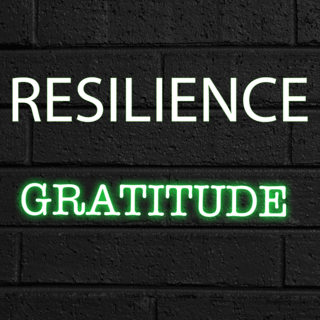Gratitude
Resilience and the Practice of Gratitude
How a gratitude practice can contribute to your inner strength.
Posted March 29, 2020 Reviewed by Jessica Schrader

Resilience is a word that has been thrown around a lot lately. Leaders, bosses, TV hosts, and reporters are all talking about how we need to be resilient during these tough times.
The thing is, rarely is it explained in-depth. Even worse, some suggest that just talking about it, reading an article, or watching a video will make you resilient.
Wrong.
That is not how true resilience works. Yes, talking and reading about it while also watching videos on resilience can help, but it must be practiced in order to demonstrate you have it and to prove you have it.
Prove it to who? Yourself, of course. The video below goes more into this.
One key aspect of resilience is having gratitude practices. I have no problem admitting that at first, this threw me off and I dismissed it. My various work includes law enforcement, investigating suicide, and helping people in crisis. I asked myself, how could gratitude possibly fit in?
Well, the more I researched gratitude, the more I realized how important it truly is and the impact it has on resilience and overall mental health.
And, the more I researched, the more I realized there are helpful and practical gratitude practices we can do to help rewire our brains to be more positive and resilient. It's all legit too, as it is based on numerous neuroscience research studies.
So, what exactly is gratitude, then? Dr. Alex Korb tells us the following in his book, The Upward Spiral: “Gratitude is a state of mind—in fact, there’s a gratitude circuit in your brain, badly in need of a workout.”
Why is this important? Dr. Korb adds: “Strengthening that circuit brings the power to elevate your physical and mental health, boost happiness, improve sleep, and help you feel more connected to other people.”
This post is not “selling” you anything. But if you are not “sold” on gratitude and its importance in relation to resilience and overall mental health, I seriously suggest you read the above quote again.
Just for safe measure, here are a few more reasons gratitude is so important. Dr. Rick Hanson connects gratitude with it being a positive emotion in his book, Hardwiring Happiness:
“Any positive emotion is an opportunity to enjoy living and to feel satisfied here and now. Positive emotions also have many physical health benefits, including boosting your immune system, protecting your cardiovascular system, and increasing the odds of a long life.”
Before continuing, let’s be clear on something. Gratitude practices are not intended to minimize any hardships you have experienced or are still going through. This post was written during the COVID-19 virus pandemic. Gratitude practices help you manage these tough times and remind you that if you stop and pause, there is still good all around us and it is happening each day.
Think of the alternative. What if we ignore the good in our lives and only concentrate on the bad things that occur each day? This is not healthy, and that fear, anxiety, depression, and stress will destroy us mentally and physically.
Again, the point of gratitude practices is that they can help you better manage any hardships you are dealing with. It is also about control and perspective.
Further, gratitude practices allow us to stop and reflect on the good instead of overlooking it and passing it off as not important.
According to research conducted by David DeSteno and his team, gratitude is connected to increasing our self-control (as shared in Emotional Success):
“In some of the experiments … we nudged participants to appraise situations in ways that give them something to be thankful for. And in each case, greater self-control was the result.”
Gratitude, therefore, is connected to cognitive reappraisal (or reframing). This simply means we have control over our perspective and how we choose to see things.
And to finish things off, let’s add some neuro-talk to get you started on your gratitude journey. It is not just doing the gratitude practice below, but doing it the right way.
Enjoy it (it’s not a chore!) and know that you are making the choice—a choice that is increasing your inner strength and your overall mental health. By taking this approach, you are building stronger neural connections that will make it easier to do it again the next day and the day after that.
This is purposefully activating the prefrontal cortex part of the brain (the thinking part of the brain) in order to eventually make gratitude practices part of your routine (the dorsal striatum part of the brain). The neurotransmitter dopamine gets released and the brain likes that.
What this all means is that it feels good to reflect on the good, and by purposely doing it repeatedly, you are working towards making it a habit. See? You do have control after all.
Give it a try
Gratitude practices are much more than just saying “thank you” internally or out loud to someone. The neuroscience research fortunately shows us how to make gratitude more impactful.
For five days, try the following practice each evening, but don’t just reflect on it; write it down in a notebook or pad.
There is value in reflecting on gratitude, yet it increases its effectiveness when you write it down. Southwick and Charney mention this in their book on resilience. The work by Dr. Sandi Mann also suggests having a daily journal reflecting on gratitude through answering specific questions.
David DeSteno adds to the value of writing it down and how important the “little” things can be with a gratitude practice:
“… It’s important to focus on the little things perhaps more than the big ones… Reflecting on the smaller and more frequent one … will work just as well.
An easy way to make this strategy part of a routine is to keep a journal… The act of writing encourages a deeper, more vivid processing of memories, and can readily immerse us in the feelings brought forth.”
So, here's the practice you can do for the next five days:
- Reflect on and write one thing that made you happy that day. Push a little deeper by thinking about it and describing at least two more words associated with the reasons why you were happy.
- Reflect on and write one thing someone else did nice for you today. This doesn’t have to be anything big either, just something that someone did for you that was nice.
- Reflect on and write one thing you did nice for someone today. I’m certain you did many things nice for others, the point is picking one, reflecting on it, and writing about it.
Note: Here’s the fun part—you cannot repeat any of them over the course of five days. Remember, this is supposed to make you think and not just robotically repeat yourself each evening. This is how you can work towards increasing your resilience and develop positive habits that stick, which means you have to do them.
Conclusion
Remember, resilience is more than reading about it. It is doing it—so give the above a try. Make it five-day practice and work towards rewiring your brain. We all have that inner strength, so let’s work on enhancing it.
Don’t forget, resilience also means reaching out for help if you need it. There is no reason you have to try and take things on by yourself. If you need help, reach out to a doctor—they can help you. You can also reach out to Crisis Text Line by texting HOME to 741741. In emergencies, of course, always call 911.
Find a therapist with the Psychology Today Therapy Directory.




